必修三 Module 4 Sandstorms in Asia
- 格式:doc
- 大小:72.50 KB
- 文档页数:9
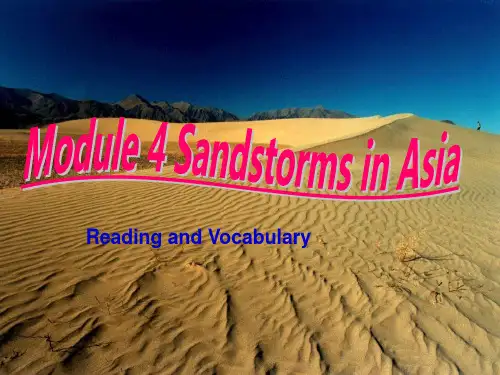
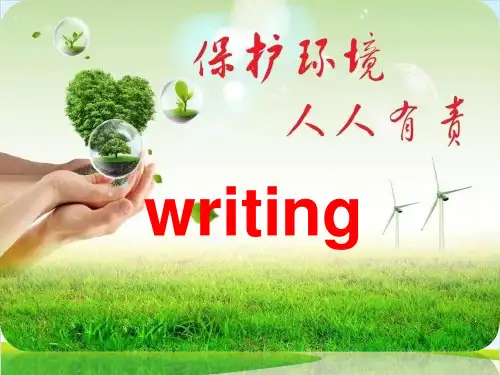
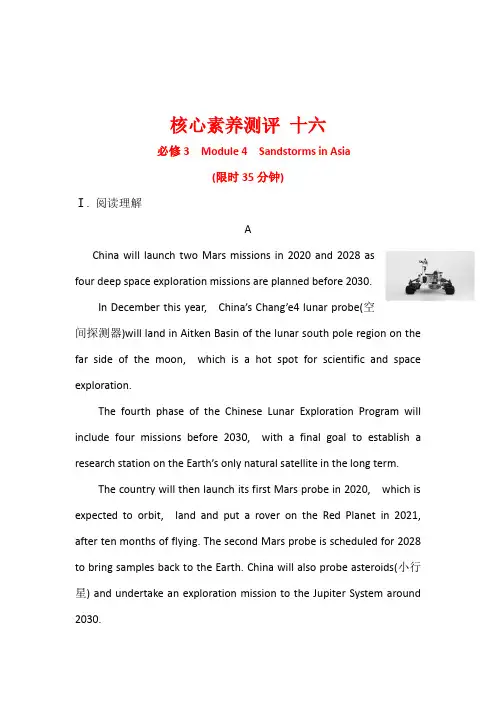
核心素养测评十六必修3Module 4Sandstorms in Asia(限时35分钟)Ⅰ. 阅读理解AChina will launch two Mars missions in 2020 and 2028 asfour deep space exploration missions are planned before 2030.In December this year, China’s Chang’e4 lunar probe(空间探测器)will land in Aitken Basin of the lunar south pole region on the far side of the moon, which is a hot spot for scientific and space exploration.The fourth phase of the Chinese Lunar Exploration Program will include four missions before 2030, with a final goal to establish a research station on the Earth’s only natural satellite in the long term.The country will then launch its first Mars probe in 2020, which is expected to orbit, land and put a rover on the Red Planet in 2021, after ten months of flying. The second Mars probe is scheduled for 2028 to bring samples back to the Earth. China will also probe asteroids(小行星) and undertake an exploration mission to the Jupiter System around 2030.Li Guoping, director general of the Department of System Engineeri ng at the China National Space Administration, said, “A new Long March 8 rocket using two 2. 25mdiameter solidpropelled boosters(助推器)is currently being researched and it will be launched in 2020. ”The heavylift carrier rocket Long March 9 to be launched in 2028, will exceed 90 meters, and the rocket would have a core stage with a diameter of 10 meters, and be able to carry a payload of 140 tonnes into lowEarth orbit, five times that of the Long March 5, according to Li.He said, “China will streng then its use of space technology to monitor the global climate and it plans to send into orbit two satellites. The country has also launched a program to study the probability of earthquake occurrence through electromagnetic monitoring. ”Li stated, “Chin a promotes cooperation between government and social capital and will improve government procurement(采购) of mercial aerospace products and services. A new regulation regarding rocket launchers will be released shortly and the country supports open and shar ed mercial space launch sites. ”【文章大意】本文是一篇新闻报道。
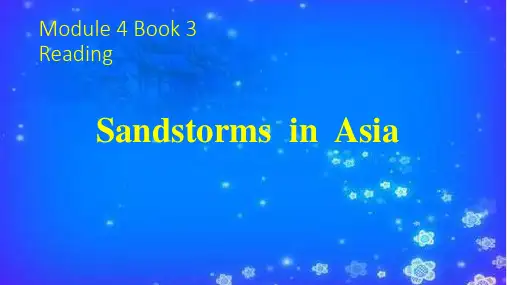
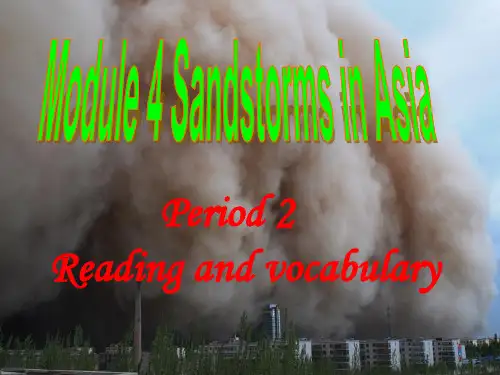
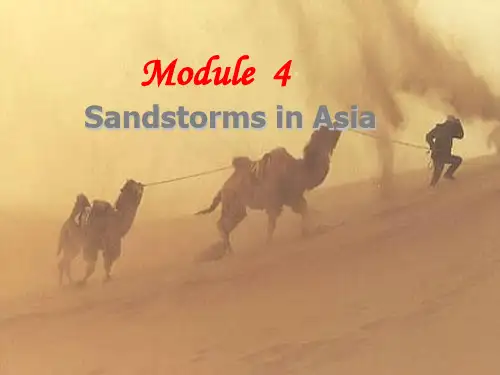
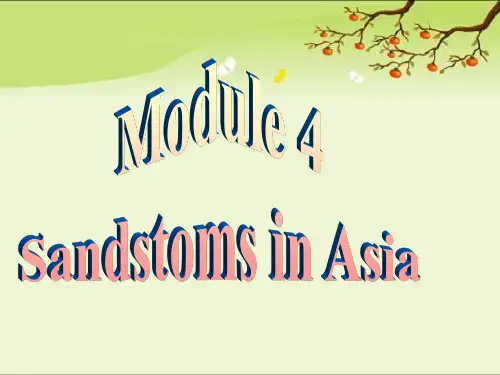
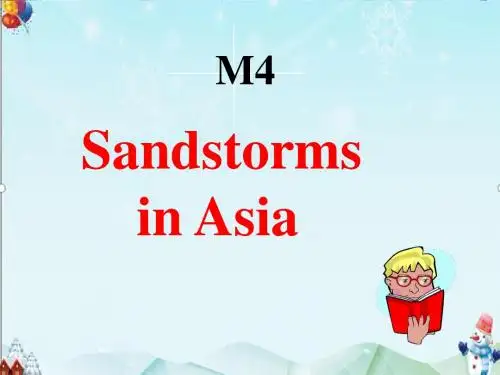
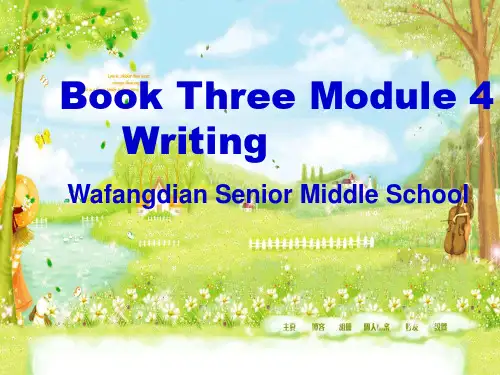
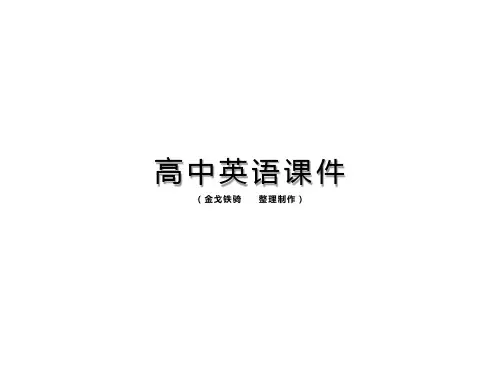
1 第二部分 必修三 Module 4 Sandstorms in Asia Ⅰ.单项填空 1.He has so much ________ that he could do the work of six ordinary men. A.force B.energy C.power D.strength 2.Some false advertisements are taking the countryside women as their targets, because they are easy to ________. A.take in B.take on C.take over D.take up 3.— The moment I saw him, he began to ________ about the bad weather he had while traveling there. — He must have had a very unpleasant journey there. A.complain B.compensate C.compromise D.explain 4.Don't mention that at the beginning of the story, or it may ________ the shocking ending. A.give away B.give out C.give up D.give off 5.Since the matter was extremely ________, we dealt with it immediately. A.tough B.tense C.urgent D.instant 6.________ magazines to find pictures that you can stick on your poster. A.See through B.Look into C.Look through D.Pull through 7.I don't think they have any food left. ________, lend them some. A.If possible B.If so C.If not D.If ever 8.After the explosion, the roads are full of ________ people who are anxious to leave the city. A.afraid B.frightened C.frightening D.scary 9.When she sings, Carol's voice must be loud enough ________ by four thousand people. A.to hear B.to be heard C.having heard D.being heard 2
10.Having been warned of the likely lung cancer, Mr White had to ________ on smoking. A.cut down B.cut off C.cut in D.cut out 11.________that he might fail the driving test, he made several more calls to confirm the result. A.Concerns B.Concerning C.Concerned D.To concern 12.________, education is about learning and the more you learn, the more equipped for life you are. A.As far as I concern B.As far as I am concerned C.So far as I am concerning D.So far as I was concerned 13.The teachers and students are talking in a relaxing ________. A.atmosphere B.state C.situation D.phenomenon 14.We took our umbrellas with us when we went out in order to ________ us from a heavy rain. A.ban B.preserve C.prevent D.protect 15.Liu Hulan was ________ great a heroine ________ we should learn from her. A.such; that B.so; that C.such; as D.so; as Ⅱ.完形填空 Computer hackers (黑客) have now got their hands on mobile phones. “A phone virus (病毒) can __16__ your phone do things you have no control over,” computer security experts __17__. It might __18__ the White House or the police, or forward your personal address book to a marketing company. Or it could simply eat into the phone's operating software, turning it __19__and erasing your personal information. Similar viruses have already made mobile phone owners __20__ in Japan and Europe. Ari Hypponen, chief technical officer of a computer security in Finland, said, “A virus can get your __21__ and send them elsewhere. And it can __22__ your passwords.” Mobiles are now able to surf the net, send emails and __23__ software, so they easily become a __24__ for the same hackers who have sent viruses to computers over the last decade. “It's technically __25__ now,” said Stephen Trilling, director of research at anti-virus __26__ maker Symantec Corp based in the US.“If the phone is connected to the __27__, it can be used to transmit threats and __28__ targets, just as any computer can.” 3
In Japan, if you open a certain email message __29__ your mobile phone, it will cause the phone to repeatedly __30__ the national emergency number. So operators have to __31__ emergency calls until the bug is __32__. In Europe, mobile phone's short message service, __33__ SMS, has been used to send codes that could damage phones. Mobile phone users can __34__ viruses, of course, by sticking to their traditional phones __35__ Web links, some experts said. 16.A.get B.force C.make D.cause 17.A.speak B.talk C.tell D.say 18.A.lead B.connect C.reach D.call 19.A.off B.over C.down D.on 20.A.interested B.angry C.excited D.happy 21.A.messages B.passages C.news D.information 22.A.get B.check C.invent D.delete 23.A.make B.destroy C.download D.develop 24.A.job B.task C.mission D.target 25.A.impossible B.possible C.useful D.valuable 26.A.hardware B.software C.computer D.equipment 27.A.computer B.television C.Internet D.radio 28.A.strike B.visit C.inquire D.attack 29.A.in B.by C.on D.with